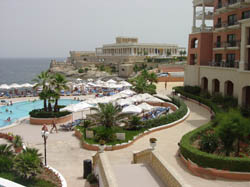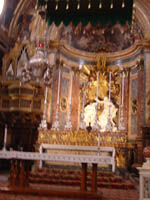July was hot in Malta, but not as humid as we thought it
would be, considering that it is surrounded by water. We were there for
the 13th Annual Malta Jazz Festival sponsored by: Vodafone, Knight Music,
Le Meridien Phoenicia, The Embassy of the United States of America-Malta,
and Cisk Beer.
Malta is located in the heart of the Mediterranean Sea, 58 miles south of
Sicily and 163 miles North of Tunisia, North Africa ('you know, the place
where Dizzy spent the night). Malta is its own country of five islands,
three of which are habitable. It is ancient and full of history. Click here to read about its history at
the Malta web site.
 We stayed at the Westin Hotel in Dragunara Point.
It is a piece of land that jutted out from the northern shore of Malta.
Our hotel room overlooks the Oracle Casino with roman columns and the Mediterranean
Sea. (photo at left). The Hotel has a beautiful swimming pool that is opened
to the guests all day. However, you can also swim in the Mediterranean,
just a few feet away. It seems to me that the shoreline of northern Malta
is quite rocky. I didn't see any beaches. However, wherever there is a tiny
little patch of sand that leads to the sea water, you'll find people entering
into the sea there to swim. The swimmers don't seem to be worried about
the midday sun. There are people swimming from dawn till dusk. Other than
that, you find Malta quiet between 1 A.M. to 4 P.M. The streets
are deserted during this time. Some of the stores are even closed, but we
found this to be a great time to walk around and enjoy the sights.
We stayed at the Westin Hotel in Dragunara Point.
It is a piece of land that jutted out from the northern shore of Malta.
Our hotel room overlooks the Oracle Casino with roman columns and the Mediterranean
Sea. (photo at left). The Hotel has a beautiful swimming pool that is opened
to the guests all day. However, you can also swim in the Mediterranean,
just a few feet away. It seems to me that the shoreline of northern Malta
is quite rocky. I didn't see any beaches. However, wherever there is a tiny
little patch of sand that leads to the sea water, you'll find people entering
into the sea there to swim. The swimmers don't seem to be worried about
the midday sun. There are people swimming from dawn till dusk. Other than
that, you find Malta quiet between 1 A.M. to 4 P.M. The streets
are deserted during this time. Some of the stores are even closed, but we
found this to be a great time to walk around and enjoy the sights.
When I sit down in a restaurant here in the United States, the wait person
brings me a glass of water, before he or she asks me for another choice
of drink. I have learned to appreciate the "free" glass of water,
that is being filled constantly. The first glass of water I asked for during
this trip to Malta was at Heathrow Airport in London, and I was asked if
I wanted "still" or "frizzled." From then on, we had
to pay for every glass or bottle of drinking water, either "still"
or "frizzled/sparkling/bubbly." In fact, water cost more in Malta
- about .85 lira (85 cents, they called it) a bottle, verses .50 lira for
beer or Kinnie at the festival.
Ooh, I have learned to love Kinnie. The advertising in the Malta Airline
Magazine said, "A unique refreshing blend of Mediterranean oranges
and aromatic herbs." A Maltese, on the plane, warned me that it has
a little bitter taste, and it does, after you swallow the liquid, but it
IS refreshing. It is a non-carbonated, nonalcoholic drink, like a juice
and is available on the plane or any where in Malta, and it is cheaper than
water!
There are no hills in Malta, the main island. Higher
grounds, maybe, but not like hills I know, Taylor Street in San Francisco,
Marin Street in Berkeley, or Maybelle Street in my neighborhood in Oakland,
California. The western portion of the island is higher than the eastern
part. The whole island looks like a huge beautiful piece of rock, rather
flat, that is raised above the sea level. Everything seems to be sand color.
There are not many trees. There are mostly scrubs and bushes. Quite a few
beautiful and colorful uses of Oleanders, and cacti. Even the buildings
are sand color (see photo at right). Older ones are built from rocks and
newer ones, cement. The only colors on the buildings are the shutters, wrought
iron balconies and doors which are mostly bright green, and some red. Doors
are usually opened from the center, unlike our doors here that open from
one side. The door handles are ornate and interesting. I saw handles in
the shape of dolphins, horns, etc. Most houses are only one or two stories.
Mostly apartments, with the newer ones going up to six stories high. The
only high-rise I saw is a hotel, over thirty-stories tall. I read from the
local English newspaper (there is a Maltese newspaper and an English newspaper)
that the hotel is not earthquake proof. What a thought! I asked one of the
locals if there are earthquake in Malta, and he said no. But I thought,
it is just south of Italy, wouldn't Malta be affected? Well, maybe they
know better.
 |
|
|
Valletta is the capital city of Malta. It was the first planned
city in Europe, such a distinction. We spent a short afternoon there, visiting
the St. John Co-Catheral, where every inch of the building is either painted
or caved (photos above); and experiencing the narrow streets. Cars are small
in Malta. Even their trucks look small. Big SUV won't work here. The streets
are very narrow (see photo at left). A street that is about ten feet wide,
would accommodate one way traffic (that is including parking on one side
and a one-foot wide sidewalk on each side of the street). Or, about fourteen
feet wide for two way traffic. Well, not all streets are that narrow, but
most of those in Valletta are like that, and none are wider than the street
in front of my house here in the States.
We had to go through St. Julian, where all the clubs are, to get to our hotel. Every night, we had to wait for the fun loving young people to move aside for the vehicles. As I said, the sidewalks allow people walking single file. When there is a crowd, it spills onto the roadway. The cars, politely stop and go, they have to weave through the crowd at about 5 miles per hour.
That bring us to another observation. There are a lot of young people, especially in St. Julian. Midnight, two a.m., you can find young people, teenagers, those in their twenties, wondering around the area at night, sitting on the curb smoking, filling up the bars and seem to be having an un hassled good time. They were there every night when we went through. I asked our driver how old do you have to be to drink alcoholic beverages. He said, sixteen. Then I asked, how old to vote. He said, eighteen. Ha, you can get drunk before you can vote in Malta! Then I was reminded that in Europe, wine is like water and is served with each meal.
Center Square of Mdina
|
Street of Mdina
|
Looking northeastward from Mdina
|
We went to the old city of Mdina at the southwestern side
of the island (photos above). It was an old capital. In fact, it looks look
a castle, with heavy wooden doors in entry ways, a sunken area around the
"castle" that could have been be a moat at one time. We took the
bus there. I was told by a French tourist, who also went to the Jazz festival,
that he and his family bought bus passes and went all through Malta by bus.
I wanted to get the same experience, so I learned that all buses go to Valletta,
and then go in all directions. When we were at the bus stop for Mdina, a
lady made sure we got on the correct bus that went from St. Julian to Mdina
without having to route back to Valletta. I really appreciate her help,
and we didn't even have to ask for it. We were, of course, very obviously
tourists.
The bus fare to Mdina, which is about a twenty-minute drive, cost us 40
cents per person, one way. We went through different areas of Malta, and
saw some of the beautiful and interesting countryside. I found out that
the buses were individually owned. There was negotiation going on between
bus owners and the transportation authority to upgrade the buses so that
they would have fare-collecting machines. Right now, one gives the bus driver
the fare, he makes change, and gives you a little slit of paper as a receipt.
Some of the buses were air-conditioned, but some were not. The one that
took us to Mdina was not air-conditioned, but the one that took us back
to St. Julian, was. However, the fare is the same. All sorts of people ride
the buses. I guess people in Europe are used to riding in buses because
owning a car is costly, gas is expensive and parking spaces are scarce.
So that is unlike people here in the States, where there seems to be a stigma
about riding in buses. No wonder our U.S. public transportation is in such
a bad state of despair.
Another thing I learned about Malta is that the literacy rate is about 97%.
Education, up to college level, and health care is free for all citizens
of Malta.
| |
|
There are a lot more places I want to see and experience in Malta, lots
of its history I want to learn. The people there made it easy for us because
they all speak English and they are very friendly. They also have their
own language, Maltese. I loved my experience in Malta and I hope to go back
soon. Jazz takes you to the best places on this planet.
by Stella Cheung Houston
Photos by Haybert K. Houston and Stella Houston
Click here for the Sounds
of Malta found in the August 2003 edition of Jazz Now Interactive
Back to ![]() Contents Page
Contents Page
Jazz Now Interactive
Copyright Jazz Now, September 2003 issue, all rights reserved
jazzinfo@jazznow.com